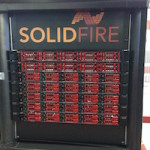On April 19, researchers gathered at the Ohio Supercomputer Center for the Statewide Users Group (SUG) spring conference to collaborate and share ideas with peers and OSC staff. “SUG encompasses all OSC clients and receives direction from the SUG executive committee, a volunteer group composed of the Ohio university faculty who provide OSC’s leadership with program and policy advice and direction to ensure a productive environment for research.”
Video: Why Not all NAS Architectures can keep up with HPC
In this video, Curtis Anderson from Panasas describes how different NAS architectures optimize data flow to bring competitive advantage to your business. “You have a vision: to use high performance computing applications to help people, revolutionize your industry, or change the world. You don’t want to worry if your storage system is up to the task. As the only plug-and-play parallel storage file system in the market, Panasas helps you move beyond storage so you can focus on your big ideas and supercharge innovation.”
iRODS Consortium adds Members and Joins OpenSFS
iRODS is taking an active role in Lustre community. The iRODS Consortium recently signed on to the Open Scalable File Systems, Inc (OpenSFS), a nonprofit organization dedicated to the success of the Lustre file system, an open source parallel distributed file system used for computing on large-scale high performance computing clusters.
NetApp to Acquire SolidFire for All-Flash SSDs
Today NetApp announced it has entered into a definitive agreement to acquire SolidFire for $870 million in cash. Founded in 2010, SolidFire is a market leader in all-flash storage systems built for the next-generation data center where simple scaling, set-and-forget management, assured performance and multi-tenancy, and cloud economic models are driving new market growth.
NCI Boosts Storage to 44 Petabytes with Fujitsu & NetApp
NCI in Australia has signed a $2M deal with Fujitsu to work with storage and data management company NetApp to supply and install all-flash storage arrays with a raw storage capacity of 11 petabytes, bringing NCI’s total raw storage capacity from 33 petabytes to 44 petabytes.








